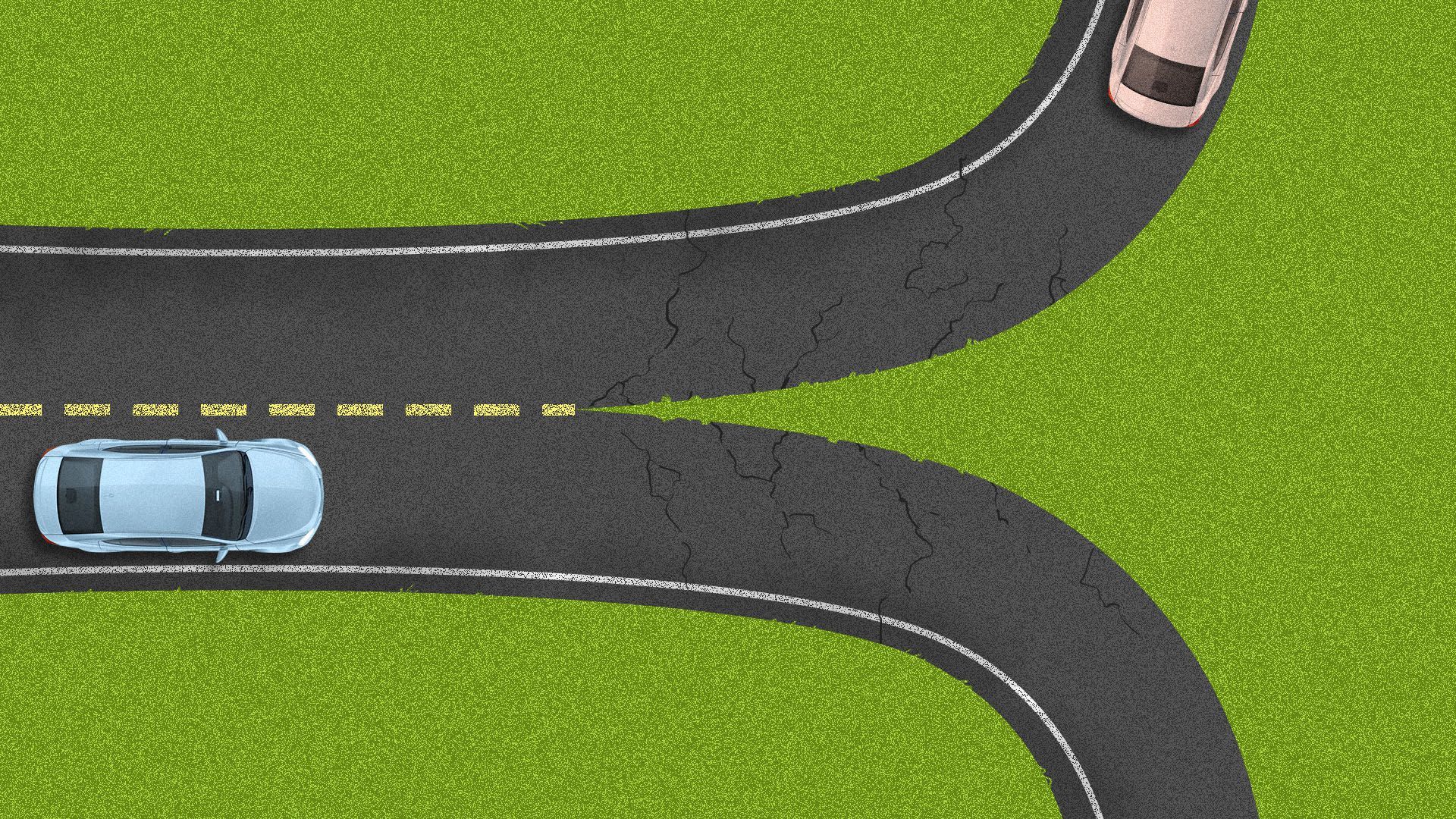Why automakers splintered over Trump's emissions war with California
Add Axios as your preferred source to
see more of our stories on Google.

Illustration: Sarah Grillo/Axios
There's stark new evidence that big automakers are divided over how to navigate White House moves to upend mileage and carbon emissions policies.
Driving the news: GM, Toyota, Fiat-Chrysler and others are now backing the Trump administration's move to yank California's power to impose CO2 rules — and by proxy mileage rules — that exceed federal standards.
- Monday night's move to intervene in litigation on the matter splits them from Ford, VW, Honda and BMW — the quartet that struck a deal with California on toughening standards through the mid-2020s.
The intrigue: Axios' Joann Muller points out that where automakers stand largely depends on their future product pipeline and where they think the market is headed.
- Volkswagen is betting heavily on electric vehicles in the wake of its diesel emissions scandal. Ford is aligned with VW.
- Honda is already the industry’s most fuel-efficient carmaker.
- GM, on the other hand, doesn't think California's plan provides enough EV emissions credits to offset the sale of high-margin pickups it needs to finance its bets on future technologies like autonomy.
- Some foreign automakers, especially, are worried about angering Presdient Trump, who is still weighing big tariffs on auto imports that could wreak havoc on their business.
Why it matters: California is the nation's biggest auto market and about a dozen states follow its lead on emissions rules.
- Automakers want to avoid a split national market, but they're at odds over how to get there — and how stringent the single standard should be.
- Plus, transportation is the nation's largest source of greenhouse gas emissions.
- The auto industry started balking a few years ago at stringent Obama-era standards that extend through 2025, but they don't like the draft 2018 White House plan to freeze the standards, and instead say there should be some level of annual increases.
What they're saying: "The automakers that made a previous deal with California may be questioning their actions if Trump wins a second term and successfully revokes California’s ability to set its own standards," Autotrader executive publisher Karl Brauer tells Axios.
- "Ultimately there’s no clear path here, and every manufacturer taking a position on this topic risks being on the losing side when it’s finally resolved," he said.
What's next: Look out for final EPA and Transportation Department rules to revise the Obama-era standards.
- EPA has hinted that the final version require slight increases.
- But that's extremely unlikely to satisfy California regulators, allied states and environmentalists, so look for this battle to drag on.
The state of play: A new note from the Rhodium Group helps explain why there's so much interest in the Trump vs. California fight — especially as it applies to the electric vehicle industry.
What they did: The research firm modeled two scenarios out to 2035.
- Keeping Obama-era rules and California's waiver, which enables the state and others that follow its lead to adopt its zero-emissions vehicles rule.
- Revoking the California waiver and implementing Trump's plan to freeze the Obama-era standards.
What they found: Freezing the standards and yanking the waiver would knock 7%–8% off nationwide ZEV sales — largely electric models — in 2035 relative to keeping the programs.
- That means 12–14 million fewer ZEVs on the nation's roads in 2035 compared to keeping the tougher rules, Rhodium said.
- Three-quarters of the sales reduction stems from weaker mileage rules, while the balance is from rolling back the California ZEV rule.
The bottom line: It underscores how policy is a key driver of EV adoption rates, even as more — and more affordable — models enter the market.
